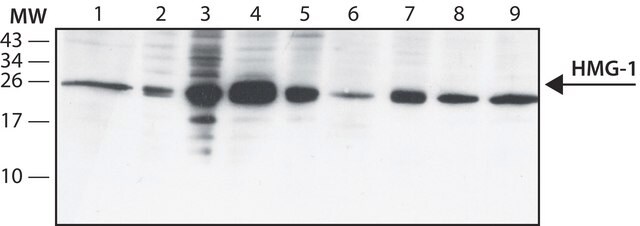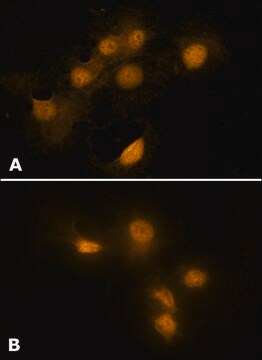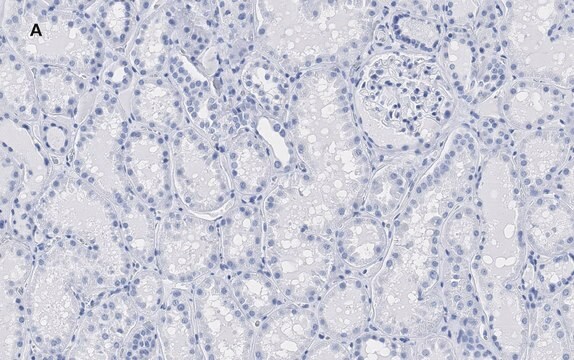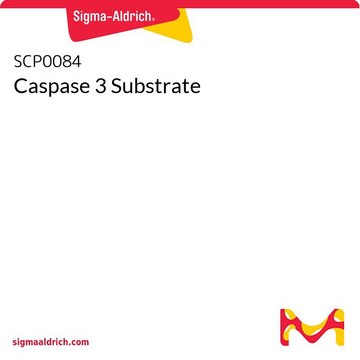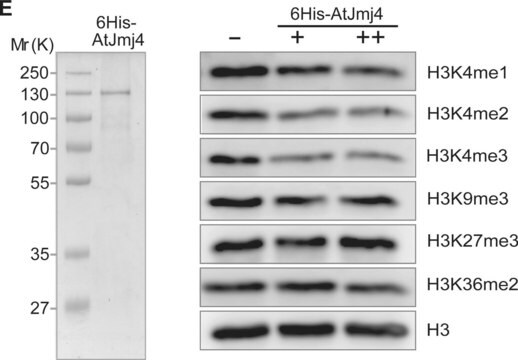MABE148
Anti-HMGB1 Antibody, clone HMG1-5H6
clone HMG1-5H6, from hamster
Synonym(e):
High mobility group protein 1, Sulfoglucuronyl carbohydrate binding protein, high mobility group box 1, high-mobility group (nonhistone chromosomal) protein 1, high-mobility group box 1
About This Item
Empfohlene Produkte
Biologische Quelle
hamster
Qualitätsniveau
100
300
Antikörperform
purified antibody
Antikörper-Produkttyp
primary antibodies
Klon
HMG1-5H6, monoclonal
Speziesreaktivität
rat, mouse, human
Methode(n)
flow cytometry: suitable
immunofluorescence: suitable
western blot: suitable
NCBI-Hinterlegungsnummer
UniProt-Hinterlegungsnummer
Versandbedingung
wet ice
Posttranslationale Modifikation Target
unmodified
Angaben zum Gen
human ... HMGB1(3146)
Verwandte Kategorien
Allgemeine Beschreibung
Immunogen
Anwendung
Epigenetik & nukleäre Funktionen
Epigenetik & nukleäre Funktionen
Chromatin-Biologie (ChIP)
Zellzyklus, DNA-Replikation & -Reparatur
Flow Cytometry Analysis: A representative lot detected HMGB1 in RAW264.7 cells treated with Cytofix/Cytoperm. (Image courtesy of Dr. Hideo Yagita, Juntendo University School of Medicine.)
Qualität
Western Blot Analysis: 1:500 dilution of this antibody detected HMGB1 on 10 µg of NIH/3T3 cell lysate.
Zielbeschreibung
Physikalische Form
Lagerung und Haltbarkeit
Hinweis zur Analyse
NIH/3T3 cell lysate
Haftungsausschluss
Sie haben nicht das passende Produkt gefunden?
Probieren Sie unser Produkt-Auswahlhilfe. aus.
Empfehlung
Lagerklassenschlüssel
12 - Non Combustible Liquids
WGK
WGK 1
Flammpunkt (°F)
Not applicable
Flammpunkt (°C)
Not applicable
Analysenzertifikate (COA)
Suchen Sie nach Analysenzertifikate (COA), indem Sie die Lot-/Chargennummer des Produkts eingeben. Lot- und Chargennummern sind auf dem Produktetikett hinter den Wörtern ‘Lot’ oder ‘Batch’ (Lot oder Charge) zu finden.
Besitzen Sie dieses Produkt bereits?
In der Dokumentenbibliothek finden Sie die Dokumentation zu den Produkten, die Sie kürzlich erworben haben.
Unser Team von Wissenschaftlern verfügt über Erfahrung in allen Forschungsbereichen einschließlich Life Science, Materialwissenschaften, chemischer Synthese, Chromatographie, Analytik und vielen mehr..
Setzen Sie sich mit dem technischen Dienst in Verbindung.